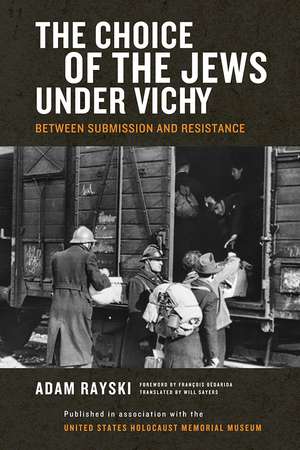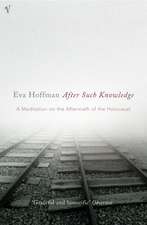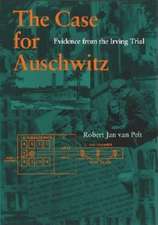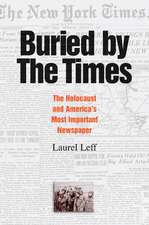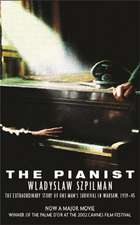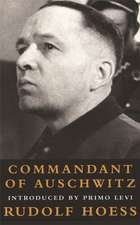Choice of the Jews under Vichy, The – Between Submission and Resistance
Autor Adam Rayski, Will Sayersen Limba Engleză Paperback – 14 aug 2015
In The Choice of the Jews under Vichy, Adam Rayski buttresses his analysis of war-era archival materials with his own personal testimony. His research in the archives of the military, the Central Consistory of the Jews of France, the police, and Philippe Pétain demonstrates the Vichy government's role as a zealous accomplice in the Nazi program of genocide. He documents the efforts and absence of efforts of French Protestant and Catholic groups on behalf of their Jewish countrymen; he also explores the prewar divide between French-born and immigrant Jews, manifested in cultural conflicts and mutual antagonism as well as in varied initial responses to Vichy's antisemitic edicts and actions. Rayski reveals how these Jewish communities eventually set aside their differences and united to resist the Nazi threat.
Published in association with the United States Holocaust Memorial Museum
Published in association with the United States Holocaust Memorial Museum
| Toate formatele și edițiile | Preț | Express |
|---|---|---|
| Paperback (1) | 192.97 lei 6-8 săpt. | |
| MR – University of Notre Dame Press – 14 aug 2015 | 192.97 lei 6-8 săpt. | |
| Hardback (1) | 835.41 lei 6-8 săpt. | |
| MR – University of Notre Dame Press – 31 iul 2022 | 835.41 lei 6-8 săpt. |
Preț: 192.97 lei
Nou
Puncte Express: 289
Preț estimativ în valută:
36.93€ • 38.41$ • 30.91£
36.93€ • 38.41$ • 30.91£
Carte tipărită la comandă
Livrare economică 14-28 martie
Preluare comenzi: 021 569.72.76
Specificații
ISBN-13: 9780268040611
ISBN-10: 0268040613
Pagini: 408
Ilustrații: 1 map
Dimensiuni: 153 x 227 x 25 mm
Greutate: 0.64 kg
Ediția:1
Editura: MR – University of Notre Dame Press
ISBN-10: 0268040613
Pagini: 408
Ilustrații: 1 map
Dimensiuni: 153 x 227 x 25 mm
Greutate: 0.64 kg
Ediția:1
Editura: MR – University of Notre Dame Press
Recenzii
“Adam Rayski’s . . . book is arguably the most detailed and comprehensive account of the history of the Jews and the Jewish resistance in Vichy France. The study incorporates multiple, previously inaccessible, unpublished primary sources, written as well as oral. Yet the book is also itself a first-hand testimony, an engaged biographic narrative presented by a participant and witness. Overall, Rayski skillfully manages this difficult double role. Rayski’s study of the fate of the Jews in Vichy France is not only a moving document but a major scholarly contribution to the resistance of the Jewish ‘combatants of an unequal combat.’” —Journal of Contemporary History
“One of the most informed memoirs of the Occupation, the book is also a shrewd and detailed analysis. It is nuanced in its approach and yet ready to be decisive and provocative in its judgments. Anyone searching for context as well as narrative will be richly rewarded by a thematic concentration on the multiple constraints which faced the Jews in Vichy France. . . . This is both witness and history of exceptional provenance and quality.” —The English Historical Review
"[Rayski] pieces together the 'hidden face' of daily Jewish life under the Occupation and relates the experiences of those who went underground—an especially rich and valuable discussion as this phenomenon has rarely been studied." —Library Journal
“Originally published in 1992, new research conducted by the author updates the previous edition and includes previously unpublished archival source material.... An overarching element of the text reviews why three-fourths of French Jews survived.... This highly recommended book is suitable for anyone concerned with resistance, the Holocaust, Jewish studies, or the history of the Jews under Vichy.” —History: Reviews of New Books
“Rayski, who served as an official of an important Jewish resistance organization under Vichy, examines Jewish responses to Vichy policy as a series of choices . . . Rayski's approach effectively portrays French Jews as much more than passive victims of an oppression imposed on them from above; rather, through oral and written testimonies and extensive archival research, he conveys the Jews' involvement in their own collective destiny . . . Recommended.” —Choice
Notă biografică
Adam Rayski (1913–2008) left Poland in 1932 for Paris, where he became a full-time journalist working for the Neie Presse, a leftist Yiddish-language daily newspaper. From July 1941 until the end of World War II he served as national secretary of the Jewish Section of the French Communist Party and headed the Union des Juifs pour la Résistance et l'Entraide, in which he played a major part in Jewish survival in France.
